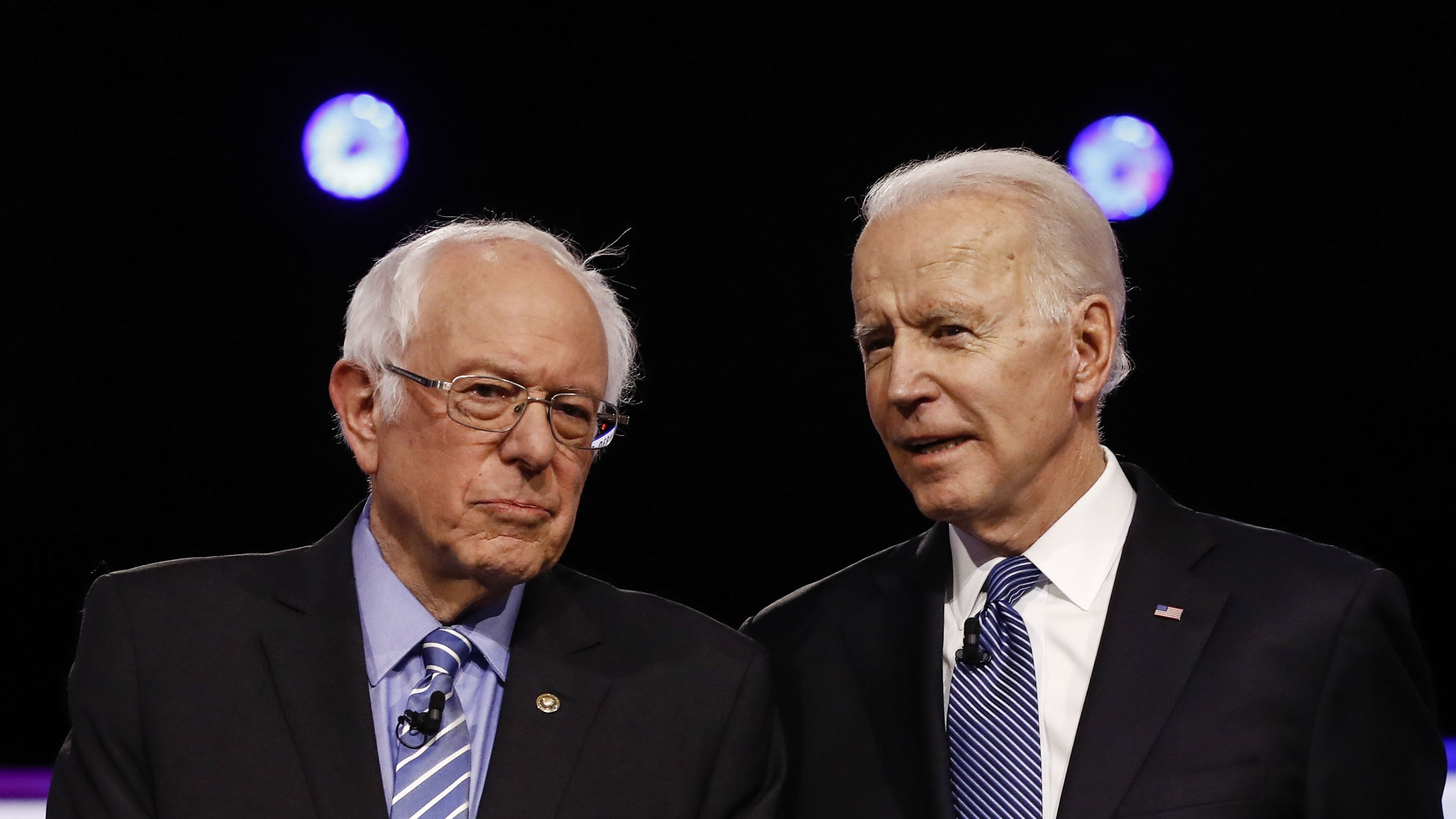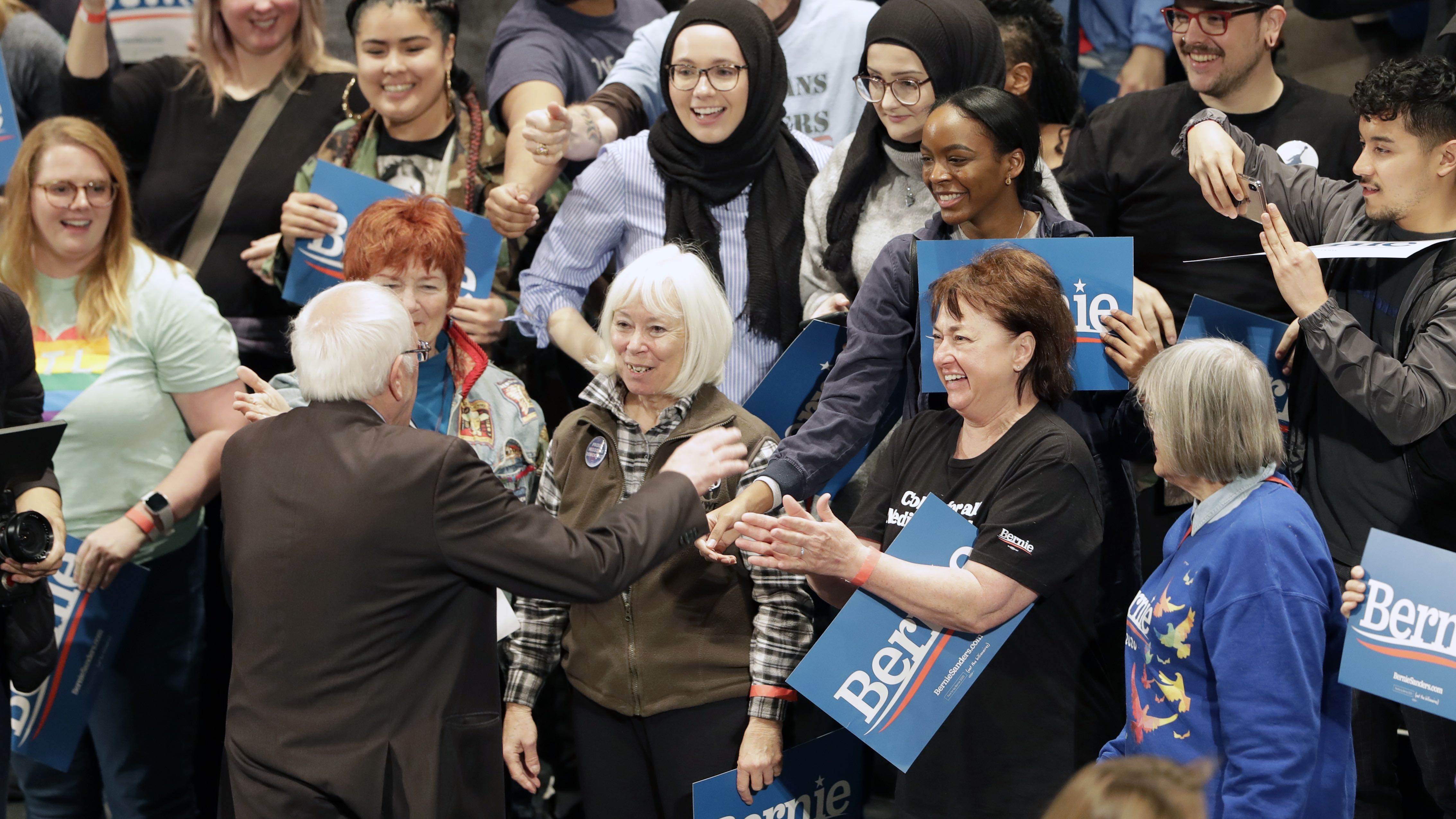
Bernie Sanders and Joe Biden talks before a Democratic presidential primary debate, Charleston, South Carolina, February 25, 2020. /AP
Bernie Sanders and Joe Biden talks before a Democratic presidential primary debate, Charleston, South Carolina, February 25, 2020. /AP
Joe Biden comprehensively beat Bernie Sanders in four primaries and was competitive in two yet to be called on Tuesday, putting him on the cusp of the Democratic nomination to take on Donald Trump in the 2020 U.S. presidential election.
Biden stresses unity after beating Sanders in Michigan
Here are five takeaways from Tuesday's primary contests.
1. Biden on the cusp
The race is now Biden's to lose.
The former vice president won four states, including the critical battleground of Michigan, on Tuesday, his delegate lead has stretched into double digits and polling suggests he is on course for big victories in high-delegate contests next week.

Joe Biden, accompanied by his wife Jill, arrives to speak to the press at the National Constitution Center, Philadelphia, Pennsylvania, March 10, 2020. /AP
Joe Biden, accompanied by his wife Jill, arrives to speak to the press at the National Constitution Center, Philadelphia, Pennsylvania, March 10, 2020. /AP
The 77-year-old is also proving his ability to bring out a broad coalition of black, white, suburban, urban and working class voters and expand the electorate in states including Michigan, where turnout was set to rise from 1.2 million in 2016 to 1.7 million. There were weaknesses too, including with Latinos and younger voters, but he made a strong electability case.
Biden's victory speech was calm and measured, praising Sanders' supporters and appealing for unity while also stressing his credentials as an "honest, trusted, steady leader."
Several things will have to go very wrong for him not to be the nominee.
2. No clear way back for Sanders
The loss in Michigan was particularly painful for Sanders, and barring an unforeseen event it's difficult to see how he can win the nomination.
In Michigan, a state which he won in 2016, he was down by around 15 points. In Mississippi he struggled to even hit the 15 percent needed to be viable for statewide delegates.

Bernie Sanders greets supporters after speaking during a campaign rally, St. Louis, Missouri, March 9, 2020. /AP
Bernie Sanders greets supporters after speaking during a campaign rally, St. Louis, Missouri, March 9, 2020. /AP
The 78-year-old's theory of the race is to bring new, young people out to vote – they haven't turned up for him, and his support from rural and blue collars in 2016 increasingly looks to have been in part an anti-Hillary Clinton vote.
He told ABC on Sunday "I'm not a masochist who wants to stay in a race that can't be won," and with four states voting next Tuesday that he lost in 2016 there is little chance of good news soon.
Sanders, who like Biden cancelled a rally in Ohio on Tuesday evening over coronavirus fears, did not address supporters or the media, instead traveled back to his home state of Vermont.
He now has some big decisions to make.
3. The Democrats need to unite
The next question is how willing Sanders' supporters are to back Biden if their candidate drops out.
The former vice president reached out to Sanders on Tuesday evening, but will need to start talking about the issues the Vermont senator's supporters care about and show he understands their frustrations.

Rubyna Ali plays pool at an informal campaign party for Bernie Sanders, Seattle, Washington, March 10, 2020. /AP
Rubyna Ali plays pool at an informal campaign party for Bernie Sanders, Seattle, Washington, March 10, 2020. /AP
"I want to thank Bernie Sanders and his supporters for their tireless energy and their passion," Biden said on Tuesday evening. "We share a common goal, and together we'll defeat Donald Trump. We'll defeat him together."
Biden's demographic weaknesses, and Sanders' strengths within the Democratic Party are with Latino and young voters. He's already investing heavily in appealing to Latinos, battling a trust deficit after the deportations during the Obama administration.
4. What will happen in the debate?
The approach Sanders takes over the next week will go a long way to determining whether many of his supporters will rally behind Biden.
The men are scheduled to face off in a debate in Arizona on Sunday.
In The Spotlight
Joe Biden, back from the brink
Bernie Sanders, a progressive prophet
For Biden it's a simple formula: Don't mess up and act the general election candidate – there's no value in him getting in a scrap with Sanders.
Sanders has bigger questions: Should he turn up, and if he does will he go after Biden or make the case for his agenda and attack Trump? The numbers are stacked against him, so he has a choice over whether he wants to play a part in uniting the party or risk exacerbating divisions.
5. Warning signs for Trump
The win for Biden in Michigan is a major warning sign for Trump, who flipped the state from the Democrats by just 10,000 votes in 2016, ahead of the 2020 general election.
Turnout surged in the battleground, and Biden has shown he's competitive in key midwestern swing states, not only overwhelmingly winning the African American vote but also tying with blue collar males – Sanders won working class men by 22 points in 2016.
Primaries don't translate directly into general elections, but Biden has also shown his strength in the suburban areas – including in Texas on Super Tuesday – that propelled the Democrats to a big generic ballot win in the 2018 midterms.
A negative for Biden is that southern states like Alabama, Mississippi and South Carolina, where he won big wins among Democratic voters, are heavily Republican – they're almost certainly not going to be in play in the general election.